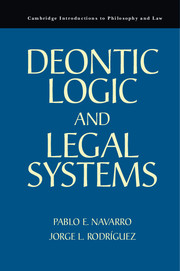Book contents
2 - Paradoxes and Shortcomings of Deontic Logic
Published online by Cambridge University Press: 05 October 2014
Summary
Paradoxes of Deontic Logic
Almost since its origins, deontic logic has been threatened by several paradoxes, elaborated by theorists to highlight different shortcomings that seem to derive from its fundamental axioms. The discovery of such paradoxes led some deontic logicians toward an attitude of general skepticism about the discipline, for as Rescher remarked, “it is…only fair to say that there is virtually no issue in the field upon which a settled consensus has been reached.”
However, no area of logic is free from paradoxes. One of the main impulses at the beginnings of alethic modal logic was a certain sort of discomfort with material implication – for example, the rather counterintuitive consequence that stems from tautologies such as (p→q) ∨ (q→p). But these new developments in modal logic did not generate a skeptical attitude toward it; instead, they were regarded as opportunities for clarifying the properties of logic itself. And in fact, the same goes for deontic logic: from a technical point of view, paradoxes provided a decisive impetus toward sharpening the basic concepts of deontic logic. Thus, even if some of these paradoxes expose serious obstacles for deontic systems, their discussion, as much as the answers that have been offered for each of them, made a significant contribution to the progress of this area of logic. As Russell rightly noticed, paradoxes and puzzles play a crucial role in testing a logical theory.
- Type
- Chapter
- Information
- Deontic Logic and Legal Systems , pp. 39 - 77Publisher: Cambridge University PressPrint publication year: 2014



